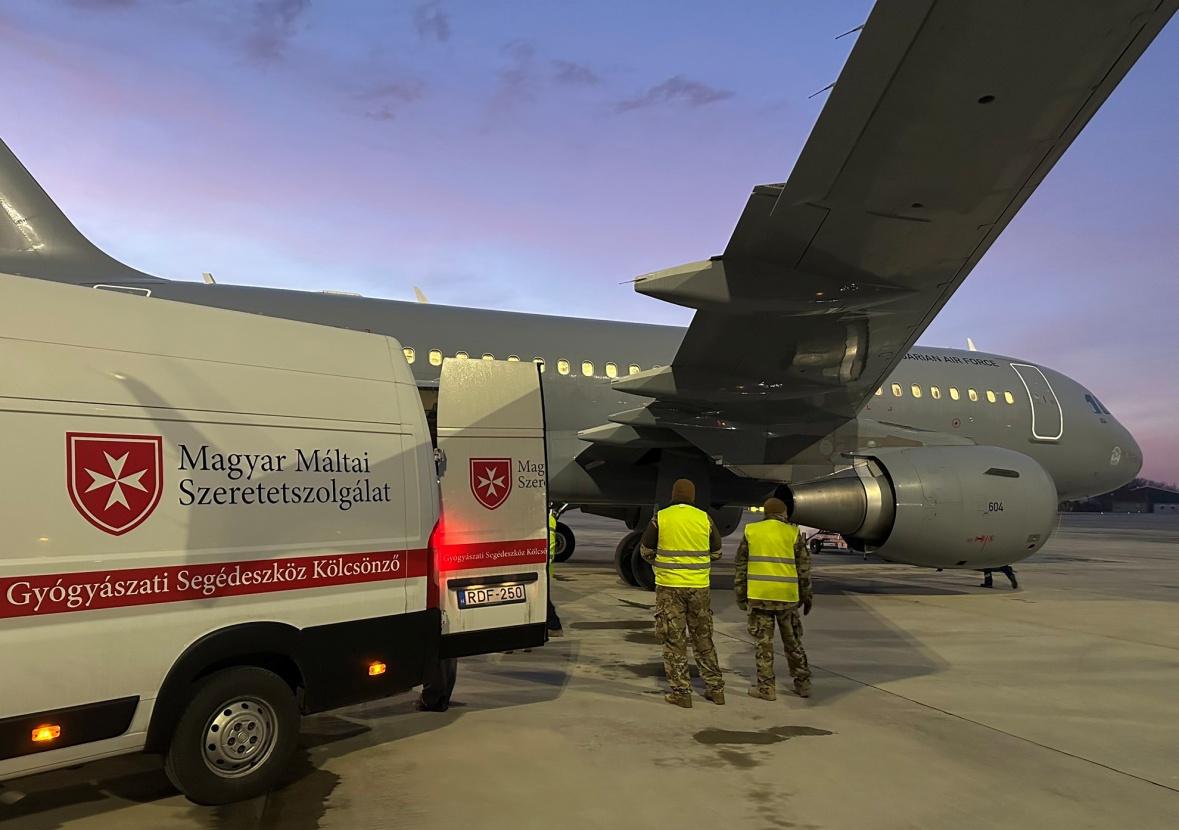
Christians in Syria are destitute, some of their priests and monks are starving.Continue reading

As the mass persecution of Christians in the hands of extremists grew to new heights amid the deafening silence of European and Western leaders, Hungary stepped up to help and deliver aid to those in need. We have been welcomed by the State Secretary for the Aid of Persecuted Christians, Tristan Azbej. He gave us a harrowing account of the fate of crisis-hit communities that he has visited in Africa and the Middle East.
Where did the idea come from to set up a government department in Hungary for the aid of Christians in need?
The Hungarian government has two considerations for the protection of persecuted Christians. One of these is values-based choice, while the other is the general humanitarian principle. We as a Christian country cannot be indifferent to the suffering of Christians in other parts of the world. Christians are currently under attack in more than fifty countries: by terrorist organizations, by the authorities, in places where they are disenfranchised and where they are under constant threat. This adds up to some 300 million persecuted people.

State Secretary Tristan Azbej. Photo: Hungary Today
The principle of Christian solidarity has led us to be the first in the world to create a government unit investigating Christian persecution. This was not done merely with the intention to make a case for them in world forums, but also to launch our own relief effort. This is called the Hungary Helps program, which is a humanitarian and development initiative. Since 2017, it has been supporting Christian humanitarian missions.
Humanitarian considerations are also present here. Just because we are Christians, it would not be right to stop our support at certain religious boundaries. It would not be a Christian behavior to help only Christians. But the persecution of Christians is one of the gravest humanitarian and human rights problems of our time. The great international aid agencies are not addressing the needs of these people, and the world’s major human rights forums only rarely discuss the protection of the rights of Christians. Our mission is not directed exclusively towards Christians, but our general human compassion dictates that we give support to a community completely abandoned and surrounded by the world’s indifference.
We are not playing favorites, but in the spirit of humanitarian principles, we are making up for the shortfalls of the international community.
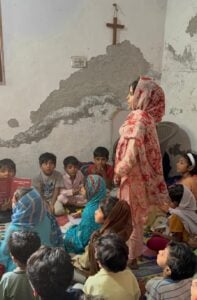
A Christian school in Pakistan. Photo: Hungary Helps
Why does the government regard this particular mission as its own?
There are certain principal foundations playing a part here, ones that the Hungarian constitution specifically refers to. It recognizes the role that Christianity played in the formation and preservation our nation. We attribute the fact that Hungary, as a nation with a small population, has survived a thousand years among the great powers to the saving power of Christianity.
But there is also a particular reason for our solidarity with persecuted Christians of our time. In Hungary, the generation of our parents and grandparents, have themselves experienced the oppression of Christians. Churches in Hungary were intimidated, ecclesiastic figures were imprisoned, and in the 1950s we even had our martyrs when Christians were killed. For forty years, anyone who lived their faith in public was subject to discrimination. Thus the memory of these times passed down in Hungarian families makes us more sensitive to the notion of persecution of Christians.
The starting impetus of our aid program was given in 2016, when Prime Minister Viktor Orbán met with church leaders from Iraq, Syria and Lebanon. He felt that they were being ignored by the West at a time when the genocidal level of persecution that Christians in the Middle East faced at the hands of Islamist fanatics grew to a shocking level. The human drama these communities are going through inspired us to action. Similarly in some regions of Africa, there is genocidal mass-persecution of Christians, yet the world was not talking about it, was not addressing it.
This meeting with church leaders took place in August 2016. Only a month and a half later a state secretariat dedicated to persecuted Christians was set up.
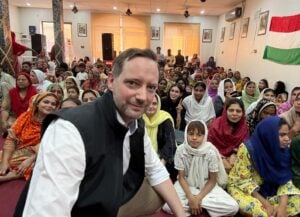
Tristan Azbej in Pakistan. Photo: Hungary Helps
What are your largest active projects at the moment?
As a small country, we have assets where we know that we can make an impact, but there are also areas where we are fairly helpless. For example, in the enforcement of human rights we do not have the appropriate influence. Places such as Northern Korea, where Christians are brutally oppressed, we cannot deliver aid. But as a humanitarian program, our strength is in creating a mechanism to deliver humanitarian aid very quickly, flexibly and directly to a particular suffering Christian community.
The program first started in the Middle East, where the collapse of the Islamic State terror group has resulted in a reduction in the persecution of Christians. But by the time we got there in 2016, Christians had already suffered huge losses due to economic and other conditions. Iraq, Lebanon, Syria are all very important areas of our support. If you look at how many Christians lived in Iraq just two decades ago and how many live there today, you see a dramatic reduction in numbers. They have gone from one and a half million to three hundred and fifty thousand. Most of them have been driven out of their lands. In Syria, their numbers have fallen from 2.3 million to half a million in a decade and a half. In Lebanon, the presence of refugees and the economic and governance crisis have led many Christians to flee their homeland.
For the remaining Christian communities in these countries we provide help by supporting their institutions. We support educational, social and health institutions, as well as the preservation of Christian cultural heritage sites. I have just come back from Pakistan, but beforehand I have visited Nigeria, where extremist Islamists are killing Christians in larger numbers than anywhere else in the world. Last year, 4,000 Christians were killed by jihadists in Nigeria. More than ten Christians are murdered every day, but there are also serious attacks on church institutions. This is where we are most active at the moment, but anti-Christian incidents are spreading towards many parts of Africa. This year we have already had to send aid to Congo, where 70 Christians were beheaded in a church. In Pakistan, too, extremist are attacking Christians, either with false accusations or pogroms. But we have already provided aid in other regions such as the Holy Land, or in the Caucasus, Armenia, where we have sent aid not because of persecution, but because of humanitarian needs arising from armed conflicts.
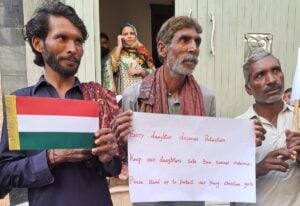
Pakistani Christians highlighting the sexual violence against women. Photo: Hungary Helps
The government has succeeded in distributing a fair amount of aid to Christian communities in need, but seems to have failed to inspire our European partners to follow our example. How can the West be made to understand that this is not an ideological issue for us all, but an existential one?
We do aim to set an example for our partners as it is vitally important to be able to organize an international coalition for this type of work. Unfortunately, there are EU countries whose governments have very different values than those that we hold dear, where we have often encountered mistrust, denial and even sharp criticism. There are countries led by political parties that explicitly reject the idea of giving direct aid to suffering Christians. They would even reject helping non-Christians if it were through the help of Christian missions. My experience with two unnamed large EU countries is that when we asked them to join faith-based aid programs, they promised that they would consider it, but only of the recipient were not Christians. When I asked them why, they replied that
it would not be politically correct for a European country to support Christian communities.
Apart from these though, there are some positive examples. The first country we were able to work with to help Christians in the Middle East was Poland. This was under the former conservative government, and unfortunately this Polish initiative is now on hold. Under the Mateusz Morawiecki government we supported Christians in Jordan in particular, those who fled Iraq and Syria.
Then two years ago the Italian government has appointed a government official for the help of persecuted religious communities, including Christians. Davide Dionisi is the special envoy, whose responsibilities include aid to persecuted Christians. We are in constant dialogue with them and we are looking for further opportunities to cooperate.
A year ago, the Austrian government has set up a unit within the Austrian Chancellery Ministry, modeled on the Hungarian example, to help persecuted Christians and other religious communities. In December, the first call for applications for persecuted Christians was launched there. Furthermore, in response to recent developments in Syria, the Cypriot government has appointed a special envoy to help the Christian minority in the Middle East. When this idea was conceived, we were contacted almost within the first days and we are now providing them with examples of our methodology and also sharing our local partners for their assistance programs.
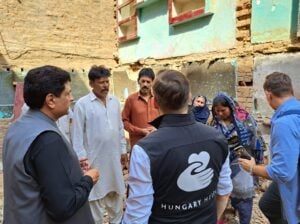
Photo: Hungary Helps
Today, we no longer have to go to Africa or Asia in order to encounter persecuted Christians. European Christians are now themselves under attack, not only rhetorically, but also legally and even physically. Are we getting to the point where we will be compelled to provide active legal assistance to European Christians too?
Much of the Western world and Europe behaves as if the lives and human rights of everyone deserve protection, except those of Christians.
However, we have already launched an aid program in Europe when in Spain, an Islamist terrorist stormed into a church, wounded a priest in the neck and killed a sacristan. We offered a donation for the injured man and one to repair the material damage.
Violent anti-Christianity is present in Europe, both physically and ideologically. The main reason behind the physical attacks is that pro-migration politicians have not been careful at all about who they let into Europe. This has given rise to Islamist terrorism, which often targets Christian people. Remember, for example, the recently beatified Jacques Hamel, who was stabbed in the throat while celebrating Mass. There is also increasing violence against Christians by left-wing anarchist and woke extremists. They are burning churches, for instance, in Poland and assaulting priests.
There is an ideology-driven anti-Christian stream in Europe, which actively denies and relativizes Christian social teaching. The indigenous Christian narrative is being banned from public life and those who nonetheless hold on to the biblical teaching are being sanctioned with increasing severity. The most blatant case of this is that of former Finnish Interior Minister Paivi Rasanen, who was hauled before the courts for quoting from the Scripture. They want to convict her of hate-speech. If a conviction were to be handed down here, it could set a precedent for depriving European Christians of fundamental human rights. Certain passages of the Bible could even be declared hate-speech. Ms. Rasanen’s is a well-known case, but there are many others. For example, that of a teacher in Ireland (Enoch Burke) who refused to call a transgender student by his chosen name. For this he was jailed, banned from his profession and his financial assets were confiscated.
We at Hungary Helps cannot fight such cases but the Hungarian governing parties and the majority of well-meaning Hungarians who support us are doing everything they can on the intellectual and political battlefield to ensure that at least in Hungary Christian people do not have to be afraid and are protected.
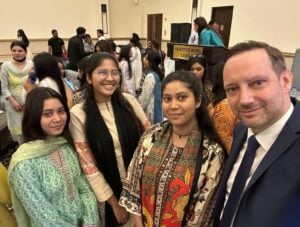
Meeting Christian women in Pakistan. Photo: Hungary Helps
If you would like to help persecuted Christians with your donations, you can do so through the Hungary Helps Program by following THIS LINK.
Featured Image: Hungary Helps